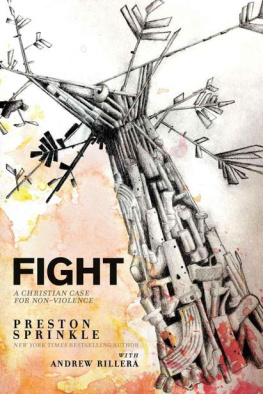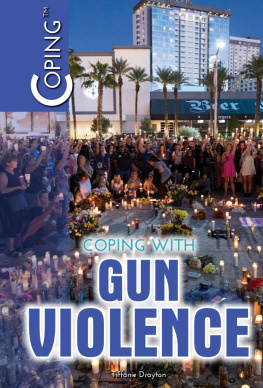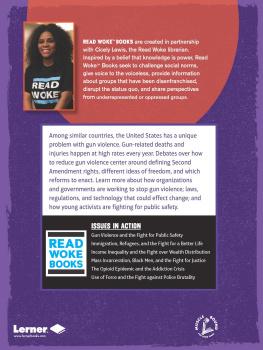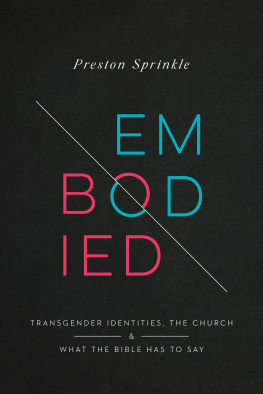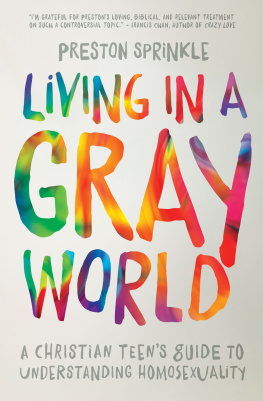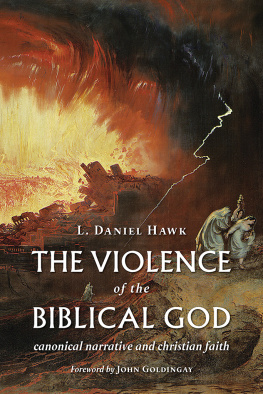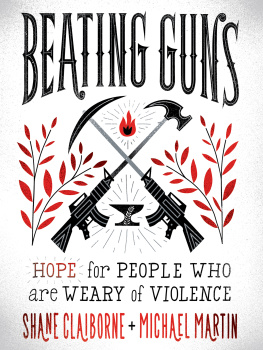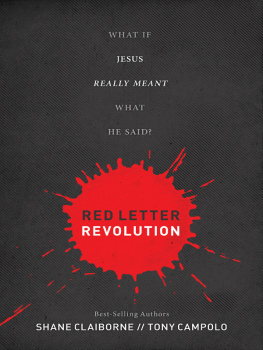Contents
ACKNOWLEDGMENTS
Since the topic of warfare and violence is furiously debated, I wanted to go out of my way to have my view critiqued before I published it. Therefore, during the writing process, I had dozens of scholars, pastors, professionals, and laypeople read parts (or all) of this manuscript.
At the top of the list is my friend and former student Andrew Rillera. Andrew is one of the brightest students Ive ever had, and therefore he was an easy choice as I sought help to write this book. He devoted countless hours to research, editing, and helping craft and recraft arguments in several chapters. Andrew is currently a masters student at Fuller Seminary, but hes got the mind and intuition of a seasoned scholar. I envy the school that picks him up to do his PhD.
Im honored that Shane Claiborne wrote the foreword to this book. Shane was an early catalyst in my own thinking on this subject. I never would have imagined that he would be writing the foreword my own book in defense of nonviolence. Thank you, Shane, for so passionately fighting for this cause.
Many other biblical scholars and historians took precious time to read through chunks of this book. Thanks to Benjamin Foreman, Ron Sider, Peter Leithart, Joey Dodson, Scott Duvall, Paul Larson, Andrew Pitts, George Kalantzis, Ben Reynolds, Jason Hood, Joel Willitts, and Richard Hess.
Special thanks to Temper Longman for carefully reading through the Old Testament chapters and walking me through his improvements as we threw down some killer Mexican food in Santa Barbara.
Many thanks also to Scot McKnight, who not only read the New Testament section and offered many helpful comments, but who also encouraged me throughout the writing process.
I also chatted with several ex- (and current) military friends about the contents of this book. Thanks to Steve Watson, Bob Armstrong, and Parker Armstrong (no relation).
Several philosophers and ethicists picked apart my last couple chapters and offered invaluable feedback. Thanks to Jeff Steele, Jeff Cook, and especially Justin Bronson, whose extensive comments on several drafts of chapters 11 and 12 exceeded my own word count in those chapters. I also thank that group of professors at Ouachita Baptist University, mostly philosophers, who went around and around with me about using violence as a last resort in defense of the innocent. Tully, Matt, Eric, Big Dread, and several others whose names have escaped me. That was a fun night. Though Im glad a fight didnt break out. I would have lost.
Several pastors and laypeople read some or all of my earlier drafts and offered very helpful comments, especially when it came to communicating to the normal person. Thanks to Matt Halsted, Gregg Lennox, Grant Pedersen, Ryan Hinkle, Matt Larson, Dalton Sprinkle, and Todd Nighswonger. Most of all, my wife, Christine, combed through several chapters and saved me from saying some pretty stupid things. Thanks, hunny, for your invaluable feedback, but most of all for being the best wife a guy could ask for.
Thanks to my four kids, Kaylea, Aubrey, Josie, and Cody, for loving me and always asking, Are you done with your book yet, Daddy? Yes, kids, Im done with my book!
Mark Beuvingmy friend, colleague, and faithful editorread through the entire manuscript with a fine-toothed comb. I cant imagine ever publishing a book without it first passing by your eyes.
And thanks to the folks at David C Cook for your commitment to me and this project: Alex Field, Caitlyn Carlson, Don Pape, and Karen Lee-Thorp.
Most of all, thank You, Jesus, for sustaining me and forgiving me for mistakes Ive made in this book. I hope that its still a pleasing aroma in Your sight and brings much glory to Your name. If it doesnt, then please raise up someone else to write a response that corrects my error. May Your truth, not mine, be magnified.
FOREWORD
Our world is plagued by violence. Youd think those of us who follow the Prince of Peace would be the hardest people in the world to convince that violence is necessarybut that hasnt always been the case. Often Christians have been the ones leading the charge to war rather than the ones standing in front of the tanks. Whats more, as we look at history, we see that some of the ugliest violence imaginable has been done by folks with the Bible in handfrom the KKK to Hitlers Germany. Its been said that no one kills more passionately than those who kill in the name of God. People have used the Bible to justify terrible evil and often the rest of the church was silent.
But the times, they are achanging. The cure to bad theology is not no theologybut good theology. There is a growing movement in the world of folks who want a Christianity that looks like Jesus again. We want to be known for life rather than death, for love instead of hatred. And there are many on the fringes of faith who know that those who kill and hate do not represent Jesus well and the good news is that Jesus has survived the embarrassing things we have done in His name. Nevertheless, we have to sing a better songwe have to live out a more compelling faith than the haters who hijack the headlines.
To that end, Preston Sprinkle has written a monumental book. Fight fills a major gap in our discipleship and plugs up a glaring hole in our gospel.
He is not interested in stale debates, endless rhetoric, or polarizing political campshe is interested in a truth that has the power to set us free from all things that hold us hostage, including violence. He is interested in a Christianity that looks like Jesus again. He is in love with a God who wants to set us free from the things that destroy us, a God who has conquered death itself and who invites us to live differently from the patterns of death that are destroying the world we live in.
Preston loves Jesus, and that makes him suspicious of violence. He believes Jesus meant the stuff He said, which means asking tough and honest questions like Can we love our enemies and at the same time prepare to kill them? Can we carry a cross and a gun?
But Preston is not satisfied with bumper sticker clichs and arguments that dodge the hard questions. He takes tough questions like What about Hitler? head on with grace and ingenuity. Preston loves Scripture and is not scared to dive into the texts of terror that have often been ignored or glossed over by Christian pacifists. Nor is he scared of the question of evil, which is something every one of us must wrestle withespecially as we consider the destruction that one person hellbent on evil is capable of. Preston makes a courageous claim in this book that he backs up brilliantly: it is possible to combat violence without mirroring it. We can fight evil without being evil.
Preston surveys the debate over war and violence across the centuries of church history. He looks at the early church in word and practice. He points to some of the greatest thinkers on ethics in the church. But in the end he reminds us that we are not called to follow Augustine we are called to follow Christ. The question Preston poses is bigger than Is violence ever justified? The question Preston asks is, What is God like, and how do we become more like God? After all, we can look at history and argue that violence has worked at times and failed at times. Likewise, we can look at history and argue that nonviolence has worked and that it has failed. In the end, the question Preston poses is, Which of these looks most like Jesus?
Even if we do not all read this book and come out on the last page ready to protest in the next war, perhaps it will at least move us all toward a healthy suspicion of violence. Maybe we will be a little slower to beat the drums of war. Maybe we will find other ways forward than drones and bombs and other ugly things. Maybe we all wont agree in disarming the world, but maybe we can agree that a country that has the capacity of nearly a hundred thousand Hiroshima bombs and spends over twenty thousand dollars a second on war can do better to align with the Prince of Peace.

